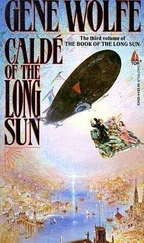Wolfe, Gene - The Best of Gene Wolfe
Здесь есть возможность читать онлайн «Wolfe, Gene - The Best of Gene Wolfe» весь текст электронной книги совершенно бесплатно (целиком полную версию без сокращений). В некоторых случаях можно слушать аудио, скачать через торрент в формате fb2 и присутствует краткое содержание. Жанр: Старинная литература, на английском языке. Описание произведения, (предисловие) а так же отзывы посетителей доступны на портале библиотеки ЛибКат.
- Название:The Best of Gene Wolfe
- Автор:
- Жанр:
- Год:неизвестен
- ISBN:нет данных
- Рейтинг книги:5 / 5. Голосов: 1
-
Избранное:Добавить в избранное
- Отзывы:
-
Ваша оценка:
- 100
- 1
- 2
- 3
- 4
- 5
The Best of Gene Wolfe: краткое содержание, описание и аннотация
Предлагаем к чтению аннотацию, описание, краткое содержание или предисловие (зависит от того, что написал сам автор книги «The Best of Gene Wolfe»). Если вы не нашли необходимую информацию о книге — напишите в комментариях, мы постараемся отыскать её.
The Best of Gene Wolfe — читать онлайн бесплатно полную книгу (весь текст) целиком
Ниже представлен текст книги, разбитый по страницам. Система сохранения места последней прочитанной страницы, позволяет с удобством читать онлайн бесплатно книгу «The Best of Gene Wolfe», без необходимости каждый раз заново искать на чём Вы остановились. Поставьте закладку, и сможете в любой момент перейти на страницу, на которой закончили чтение.
Интервал:
Закладка:
I thanked him, and he indicated that the interview was over by opening the door of the library. I could hardly believe, as I went out, that he was the same man who devoured my life in the early hours of almost every morning.
I
did not connect this sudden elevation in status with the events in the park. I now realize that Mr. Million, who has, quite literally, eyes in the back of his head, must have reported to my father that I had reached the age at which desires in childhood subliminally fastened to parental figures begin, half-consciously, to grope beyond the family.
In any event, that same evening I took up my new duties and became what Mr. Million called the greeter and David (explaining that the original sense of the word was related to portal ) the porter of our house—thus assuming in a practical way the functions symbolically executed by the iron dog in our front garden. The maid who had previously carried them out, a girl named Nerissa who had been selected because she was not only one of the prettiest but one of the tallest and strongest of the maids as well, a large-boned, long-faced, smiling girl with shoulders broader than most men’s, remained, as my father had promised, to help. Our duties were not onerous, since my father’s patrons were all men of some position and wealth, not given to brawling or loud arguments except under unusual circumstances of intoxication, and for the most part they had visited our house already dozens and in a few cases even hundreds of times. We called them by nicknames that were used only here (of which Nerissa informed me sotto voce as they came up the walk), hung up their coats, and directed them—or if necessary conducted them—to the various parts of the establishment. Nerissa flounced (a formidable sight, as I observed, to all but the most heroically proportioned patrons), allowed herself to be pinched, took tips, and talked to me afterward, during slack periods, of the times she had been “called upstairs” at the request of some connoisseur of scale, and the money she had made that night. I laughed at jokes and refused tips in such a way as to make the patrons aware that I was a part of the management. Most patrons did not need the reminder, and I was often told that I strikingly resembled my father.
When I had been serving as a receptionist in this way for only a short time, I think on only the third or fourth night, we had an unusual visitor. He came early one evening, but it was the evening of so dark a day, one of the last really wintry days, that the garden lamps had been lit for an hour or more and the occasional carriages that passed on the street beyond, though they could be heard, could not be seen. I answered the door when he knocked, and as we always did with strangers asked him politely what he wished.
He said, “I should like to speak to Dr. Aubrey Veil.”
I am afraid I looked blank.
“This is 666 Saltimbanque?”
It was of course, and the name of Dr. Veil, though I could not place it, touched a chime of memory. I supposed that one of our patrons had used my father’s house as an adresse d’accommodation , and since this visitor was clearly legitimate and it was not desirable to keep anyone arguing in the doorway despite the partial shelter afforded by the garden, I asked him in; then I sent Nerissa to bring us coffee so that we might have a few moments of private talk in the dark little receiving room that opened off the foyer. It was a room very seldom used, and the maids had been remiss in dusting it, as I saw as soon as I opened the door. I made a mental note to speak to my aunt about it, and as I did I recalled where it was that I had heard Dr. Veil mentioned. My aunt, on the first occasion I had ever spoken to her, had referred to his theory that we might in fact be the natives of Sainte Anne, having murdered the original Terrestrial colonists and displaced them so thoroughly as to forget our own past.
The stranger had seated himself in one of the musty gilded armchairs. He wore a beard, very black and more full than the current style, was young, I thought, though of course considerably older than I, and would have been handsome if the skin of his face—what could be seen of it—had not been of so colorless a white as almost to constitute a disfigurement. His dark clothing seemed abnormally heavy, like felt, and I recalled having heard from some patron that a starcrosser from Sainte Anne had splashed down in the bay yesterday, and asked if he had perhaps been on board it. He looked startled for a moment, then laughed. “You’re a wit, I see. And living with Dr. Veil you’d be familiar with his theory. No, I’m from Earth. My name is Marsch.” He gave me his card, and I read it twice before the meaning of the delicately embossed abbreviations registered on my mind. My visitor was a scientist, a doctor of philosophy in anthropology, from Earth.
I said, “I wasn’t trying to be witty. I thought you might really have come from Sainte Anne. Here, most of us have a kind of planetary face, except for the gypsies and the criminal tribes, and you don’t seem to fit the pattern.”
He said, “I’ve noticed what you mean; you seem to have it yourself.”
“I’m supposed to look a great deal like my father.”
“Ah,” he said. He stared at me. Then, “Are you cloned?”
“Cloned?” I had read the term, but only in conjunction with botany, and as has happened to me often when I have especially wanted to impress someone with my intelligence, nothing came. I felt like a stupid child.
“Parthenogenetically reproduced, so that the new individual—or individuals; you can have a thousand if you want—will have a genetic structure identical to the parent. It’s antievolutionary, so it’s illegal on Earth, but I don’t suppose things are as closely watched out here.”
“You’re talking about human beings?”
He nodded.
“I’ve never heard of it. Really I doubt if you’d find the necessary technology here; we’re quite backward compared to Earth. Of course, my father might be able to arrange something for you.”
“I don’t want to have it done.”
Nerissa came in with the coffee then, effectively cutting off anything further Dr. Marsch might have said. Actually, I had added the suggestion about my father more from force of habit than anything else, and thought it very unlikely that he could pull off any such biochemical tour de force, but there was always the possibility, particularly if a large sum was offered. As it was, we fell silent while Nerissa arranged the cups and poured, and when she had gone Marsch said appreciatively, “Quite an unusual girl.” His eyes, I noticed, were a bright green, without the brown tones most green eyes have.
I was wild to ask him about Earth and the new developments there, and it had already occurred to me that the girls might be an effective way of keeping him here, or at least of bringing him back. I said, “You should see some of them. My father has wonderful taste.”
“I’d rather see Dr. Veil. Or is Dr. Veil your father?”
“Oh, no.”
“This is his address, or at least the address I was given. Number 666 Saltimbanque Street, Port-Mimizon, Département de la Main, Sainte Croix.”
He appeared quite serious, and it seemed possible that if I told him flatly that he was mistaken he would leave. I said, “I learned about Veil’s Hypothesis from my aunt; she seemed quite conversant with it. Perhaps later this evening you’d like to talk to her about it.”
“Couldn’t I see her now?”
“My aunt sees very few visitors. To be frank, I’m told she quarreled with my father before I was born, and she seldom leaves her own apartments. The housekeepers report to her there and she manages what I suppose I must call our domestic economy, but it’s very rare to see Madame outside her rooms, or for any stranger to be let in.”
Читать дальшеИнтервал:
Закладка:
Похожие книги на «The Best of Gene Wolfe»
Представляем Вашему вниманию похожие книги на «The Best of Gene Wolfe» списком для выбора. Мы отобрали схожую по названию и смыслу литературу в надежде предоставить читателям больше вариантов отыскать новые, интересные, ещё непрочитанные произведения.
Обсуждение, отзывы о книге «The Best of Gene Wolfe» и просто собственные мнения читателей. Оставьте ваши комментарии, напишите, что Вы думаете о произведении, его смысле или главных героях. Укажите что конкретно понравилось, а что нет, и почему Вы так считаете.









